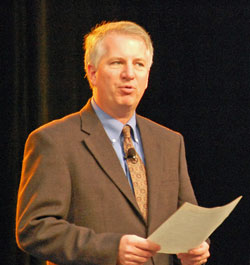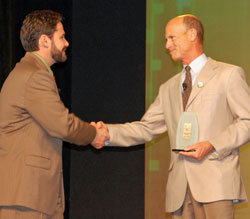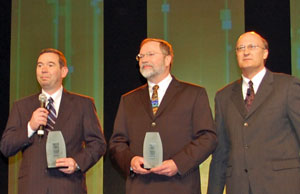 A Northern New York State auto dealer has become the exclusive installation center of ROUSH Liquid Propane Injection systems in Ford trucks and vans in the Northeastern United States.
A Northern New York State auto dealer has become the exclusive installation center of ROUSH Liquid Propane Injection systems in Ford trucks and vans in the Northeastern United States.
This press release from Ferrario Ford in Elmira, NY says it expects to convert thousands of Ford vehicles, especially the very popular F-150 and F-250 models of trucks:
With the introduction of the ROUSH Liquid Propane Injection system for the Ford F-150, ROUSH Performance has instantly become the leading supplier of Alternative Fuel Vehicles of this type. Ferrario Ford is performing F-150 upgrades now, and will begin production of the F-250 and Econoline models later in 2009.
“Every ROUSH Propane Vehicle is one less burning imported gasoline or diesel,” said Don Ferrario. “Although derived from petroleum, over 90% of propane is sourced in the U.S., with an additional 7% from Canada. Individuals, businesses, and municipalities can now purchase a no-compromise vehicle that burns virtually no imported oil.”
Selection as the Northeast U.S. installation center will be a great economic boost for Elmira, NY. Over the next few years, Ferrario anticipates upfitting several thousand Ford trucks. Customers may purchase a completed unit from Ferrario, or work with their local Ford Dealer to send a vehicle to Ferrario for upfit. Ferrario Ford is the ROUSH Propane installation center for customers in CT, D.C., MA, MD, ME, NH, NY, PA, VT, and WV.
Those who convert their F-150 to propane get a federal tax credit of $2,500 and $5,000 for F-250 and Econoline models. In addition, vehicles that burn propane get a 50-cents-a-gallon tax credit. Ferrario says drivers could see up to $2,000 a year in fuel cost savings.


 According to Green Tech, the inventor of the EFuel100 MicroFueler home ethanol maker has signed on Sierra Nevada Brewing to make ethanol from beer dregs. E-Fuel said that the beer company will start testing EFuel’s refrigerator-sized portable ethanol refineries in the second quarter of this year using discarded beer yeast as a feedstock for ethanol.
According to Green Tech, the inventor of the EFuel100 MicroFueler home ethanol maker has signed on Sierra Nevada Brewing to make ethanol from beer dregs. E-Fuel said that the beer company will start testing EFuel’s refrigerator-sized portable ethanol refineries in the second quarter of this year using discarded beer yeast as a feedstock for ethanol. 
 A new initiative was announced at the opening general session of the National Biodiesel Conference Monday –
A new initiative was announced at the opening general session of the National Biodiesel Conference Monday –  Awards were presented at the National Biodiesel Conference in San Francisco Monday to people who have helped the industry grow.
Awards were presented at the National Biodiesel Conference in San Francisco Monday to people who have helped the industry grow. National Biodiesel Board Vice Chairman Gary Haer (right) with
National Biodiesel Board Vice Chairman Gary Haer (right) with  Iowa-based Renewable Energy Group (REG) is making more inroads in the Western United States as it has opened a new biodiesel terminal in Southern Colorado.
Iowa-based Renewable Energy Group (REG) is making more inroads in the Western United States as it has opened a new biodiesel terminal in Southern Colorado. One of the first companies to realize biodiesel’s potential for both farmers and farm machinery was New Holland, thanks to the influence of Gene Hemphill, manager of North American Industry Affairs for the company, pictured here (right) with
One of the first companies to realize biodiesel’s potential for both farmers and farm machinery was New Holland, thanks to the influence of Gene Hemphill, manager of North American Industry Affairs for the company, pictured here (right) with 
 Rahal Letterman’s number 17 Team Ethanol car driven by Ryan Hunter-Reay won its first race last year at Watkins Glen, N.Y. Hunter-Reay was also named Indy 500 Rookie of the Year, but at this point he has no ride for the 2009 season.
Rahal Letterman’s number 17 Team Ethanol car driven by Ryan Hunter-Reay won its first race last year at Watkins Glen, N.Y. Hunter-Reay was also named Indy 500 Rookie of the Year, but at this point he has no ride for the 2009 season.  Organized by the Nebraska Ethanol Board, the Emerging Issues Forum is an annual regional conference for ethanol producers, marketers and related industries. Special topics this year will include ethanol policy under the new administration, innovations in corn fractionation, financial and legal issues, the blend wall, and the dynamics of RINs.
Organized by the Nebraska Ethanol Board, the Emerging Issues Forum is an annual regional conference for ethanol producers, marketers and related industries. Special topics this year will include ethanol policy under the new administration, innovations in corn fractionation, financial and legal issues, the blend wall, and the dynamics of RINs.  “These projects will be among many Obama Administration investments that will help strengthen our economy and address the climate crisis. A robust biofuels industry – focused on the next generation of biofuels – is critical to reducing greenhouse gas emissions, reducing our addiction to foreign oil and putting Americans back to work,” said Secretary of Energy Steven Chu.
“These projects will be among many Obama Administration investments that will help strengthen our economy and address the climate crisis. A robust biofuels industry – focused on the next generation of biofuels – is critical to reducing greenhouse gas emissions, reducing our addiction to foreign oil and putting Americans back to work,” said Secretary of Energy Steven Chu.